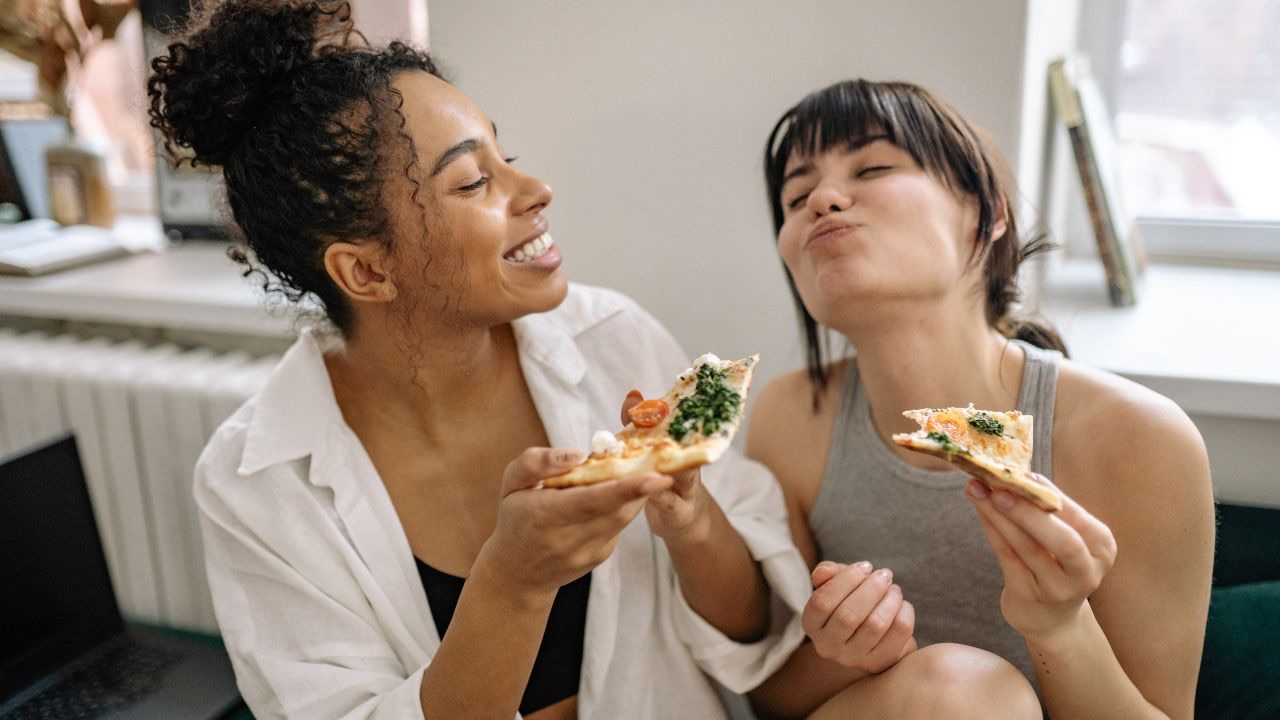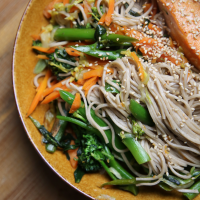What’s Intuitive Eating? Why It Helps Stop Binge & Emotional Eating
Aug 13, 2025
As a binge eating dietitian and certified Intuitive Eating counsellor, I get this question all the time:
“So… what actually is Intuitive Eating? Is it just eating whatever you feel like?”
I get it — if you’ve spent years dieting, counting calories, or swinging between “being good” and “falling off the wagon,” the idea of eating without rules can feel terrifying. I used to believe that if I gave myself permission to eat freely, I’d never stop.
But here’s the thing: Intuitive Eating isn’t a free-for-all. It’s a well-researched, structured framework that helps you rebuild the trust between your brain, body, and food — something dieting often damages.
How Intuitive Eating Started
Intuitive Eating was developed in the mid-1990s by two registered dietitians, Evelyn Tribole and Elyse Resch, after working with countless clients who had tried every diet imaginable — and still struggled with weight cycling, food guilt, and emotional eating. They saw that the harder people tried to control food, the more out of control they often felt.1
They distilled their approach into 10 principles designed to help people reconnect with their body’s internal cues of hunger, fullness, and satisfaction — rather than relying on diet rules or external control.
Since then, Intuitive Eating has been studied in more than 200 published research papers, with evidence showing benefits for mental health, body image, eating disorder recovery, and even certain physical health markers.2,3
The 10 Principles of Intuitive Eating (Explained Simply)
Here’s what they look like in real life — with some of my favourite ways clients have applied them:
-
Reject the Diet Mentality
Dieting promises quick fixes but often leads to weight regain, weight cycling, frustration, and binge episodes.4 This step is about letting go of the idea that your worth or health depends on a number on the scale.
Example: One client unfollowed every “What I eat in a day” influencer on Instagram and immediately noticed less guilt about her own meals. -
Honor Your Hunger
Chronic dieting often teaches you to ignore hunger. Intuitive Eating helps you respond to it early, before you’re ravenous — which reduces overeating.5 -
Make Peace with Food
When you allow all foods, the urgency to “eat it all now” lessens. Research shows that food restriction can actually increase cravings and overeating.6 -
Challenge the Food Police
These are the voices (in your head or from others) that say, “Carbs are bad” or “You shouldn’t eat after 7 pm.” -
Discover the Satisfaction Factor
Eating what you truly enjoy — and slowing down to notice it — often means you need less to feel satisfied.7 -
Feel Your Fullness
This is about tuning into the body’s signals that say, “I’ve had enough,” rather than clearing your plate just because it’s there. -
Cope with Your Emotions with Kindness
Food can be a coping tool, but it’s not the only one. This principle encourages adding other ways to comfort, distract, or soothe yourself.8 -
Respect Your Body
You don’t have to love your body to treat it with respect — wearing clothes that fit, getting enough rest, and eating regularly. -
Movement — Feel the Difference
Instead of punishing workouts, find movement you actually enjoy. Studies show that joyful movement improves adherence and health benefits.9 -
Honor Your Health — Gentle Nutrition
Nutrition matters — but one meal or snack doesn’t make or break your health. Focus on patterns over time.
Common Misunderstandings About Intuitive Eating
“It’s just eating whatever you want all the time.”
Not quite. While all foods are allowed, Intuitive Eating also considers how food makes you feel physically and emotionally. Over time, many people naturally choose a variety of foods because they feel better that way.10
“It’s anti-health.”
Actually, it’s pro-health — just not at the expense of mental health. In fact, Intuitive Eating has been linked to better dietary quality in adults and adolescents.11
“If I eat intuitively, I’ll lose weight, right?”
It’s not rare to see influencers promote “Intuitive Eating for weight loss,” but that’s not what it’s about. Intuitive eating is weight-neutral — the focus is on healing your relationship with food, not changing your body size. Your weight may go up, down, or stay the same, but that’s simply a byproduct of rebuilding trust with your body, not the goal.
When marketed as a sneaky “non-diet diet,” it falls back into diet culture, undermining the whole process. That’s why it’s important to learn from credible sources — like dietitians or certified intuitive eating counsellors — who teach it as intended: a way to step out of the restrict–binge cycle and make peace with food.
“It only works if you’re naturally thin.”
Research shows benefits for people of all body sizes, including reduced disordered eating behaviours, improved cholesterol, and lower blood pressure.12
How It Heals Relationship with Food & Body
Removing Restriction Breaks the Binge Cycle
One of the biggest drivers of binge eating is restriction — whether it’s skipping meals, severely limiting calories, or mentally labeling foods as “off-limits.” Intuitive Eating encourages lifting these restrictions by giving yourself unconditional permission to eat. Research consistently shows that removing restriction significantly reduces binge frequency and emotional eating episodes.13,14 When your brain no longer fears deprivation, the urgent need to overeat fades.
Shifting Focus to Health and Nourishment
Intuitive Eating shifts the focus from weight loss to health-promoting behaviours and nourishment. This gentle nutrition approach helps you choose foods that make your body feel good, without guilt or shame. Studies find that this mindset leads to improved diet quality and metabolic health markers like better blood sugar and cholesterol levels.16,17 By prioritizing nourishment over dieting, people develop sustainable habits that support long-term well-being.
Reducing Food Guilt and Shame
Diet culture often teaches that eating certain foods is “bad” or “wrong,” creating intense guilt and shame that can fuel binge episodes. Intuitive Eating dismantles these food rules by encouraging unconditional permission to eat all foods, which breaks the shame-binge cycle.1,13 This shift helps people approach food without moral judgment, reducing emotional eating triggers.
Building Mindful Awareness
IE encourages tuning into physical hunger and fullness cues — but also to your emotional state. This increased mindfulness helps you notice urges to binge before they escalate, allowing you to respond intentionally rather than reactively.20 Mindful eating supports self-regulation and emotional balance.
Restoring Trust in Your Body’s Signals
Years of dieting can dull or distort hunger and fullness sensations. Intuitive Eating supports relearning how to recognize and respond to these cues, rebuilding trust that your body knows what it needs. This reduces impulsive or emotionally driven eating.14,15
Empowering Internal Regulation over External Control
Rather than relying on diet rules, calorie counting, or external restrictions, IE fosters confidence in your internal signals. This autonomy reduces anxiety around food and eating, which often triggers binge episodes. 3
Addressing Emotional Eating Directly
Intuitive Eating acknowledges that emotions influence eating and teaches alternative coping strategies — like mindfulness, journaling, or social support — to soothe emotions without turning to food.8 This helps prevent emotional eating from escalating into binges.
Supporting Psychological Well-being
By reducing preoccupation with weight and food, IE improves overall mental health — lowering anxiety, depression, and stress — all of which are risk factors for binge eating.20
Encouraging Patience and Self-Compassion
Recovery is a journey. Intuitive Eating promotes patience and kindness toward yourself, reducing harsh self-criticism that often fuels disordered eating patterns. This compassionate approach supports sustainable healing.15
Reclaiming Joy in Movement and Eating
Finally, IE fosters joy in both movement and eating — shifting away from punishment-based exercise and rigid food rules toward experiences that feel good. This positive approach is linked with better adherence to physical activity and improved mental health.9 Rediscovering pleasure in nourishing your body and moving it in enjoyable ways helps sustain motivation and wellness.
What About Health? The Science
Research shows that intuitive eating is linked to several positive health outcomes beyond improved eating behaviours and body image:
- Better heart health: Higher intuitive eating scores correlate with lower triglycerides, higher HDL cholesterol, and healthier blood pressure.16,17
- Improved blood sugar control: Early studies suggest benefits for people with type 2 diabetes by reducing overeating and managing stress-related eating.18
- Lower inflammation: Practicing intuitive eating is associated with reduced markers of inflammation like C-reactive protein.19
- Healthier diet quality: Intuitive eaters tend to eat more fruits, vegetables, and whole grains, and fewer processed foods.11
- Weight stability: Unlike dieting, intuitive eating supports long-term weight stability, avoiding harmful yo-yo effects.2,12
- Potential benefits for bone and gut health: Emerging evidence hints that intuitive eating’s balanced approach may support bone density and a healthy gut microbiome.21,22
- Reduced anxiety and depression: Studies show that higher intuitive eating scores are associated with lower levels of anxiety and depressive symptoms.20
- Lower stress and emotional distress: By teaching healthier coping strategies and reducing food guilt, IE helps decrease stress-related eating and emotional turmoil.8,20
- Improved self-esteem and body appreciation: IE reduces body dissatisfaction and promotes body respect, which boosts overall self-worth.15
- Enhanced mindfulness and self-compassion: The approach encourages present-moment awareness and kindness toward oneself, key factors in long-term recovery from disordered eating.15,20
Wnat To Learn More?
If this is sparking curiosity, here’s where to start:
- The book: Intuitive Eating (4th edition) by Evelyn Tribole & Elyse Resch — the original guide.
- The workbook: The Intuitive Eating Workbook — practical exercises to try.
- Find a trained counsellor: Look for someone listed on the Intuitive Eating counsellor directory — so you know they’ve had proper training.
- Podcasts & blogs: Evelyn Tribole’s podcast episodes, or “Food Psych” by Christy Harrison, explore the concepts in depth.
- Work with a specialist: A dietitian trained in Intuitive Eating (like me!) can guide you step-by-step.
REFERENCES:
- Tribole E, Resch E. Intuitive Eating: A Revolutionary Program That Works. St. Martin’s Griffin; 1995.
- Denny KN, Loth K, Eisenberg ME, Neumark-Sztainer D. Intuitive eating and dietary intake in adolescents. Appetite. 2013;71:259-64.
- Tylka TL, Wilcox JR. Are intuitive eating and eating disorder symptomatology opposite poles of the same construct? J Couns Psychol. 2006;53(4):474-85.
- Mann T, Tomiyama AJ, Westling E, Lew AM, Samuels B, Chatman J. Medicare’s search for effective obesity treatments: Diets are not the answer. Am Psychol. 2007;62(3):220-33.
- Leibel RL, Hirsch J, Rosenbaum M, Thornton J. Changes in energy expenditure resulting from altered body weight. N Engl J Med. 1995;332(10):621-8.
- Polivy J, Herman CP. Dieting and binging: a causal analysis. Am Psychol. 1985;40(2):193-201.
- Macht M. How emotions affect eating: A five-way model. Appetite. 2008;50(1):1-11.
- Webb JB, Hardin AS, Williams KB, Read JP. Intuitive eating as a moderator between emotional eating and BMI. Eat Behav. 2013;14(4):488-91.
- Burgess E, Grogan S, Burwitz L. Developing and evaluating a physical activity program based on self-determination theory: A pilot study. J Health Psychol. 2017;22(3):286-98.
- Clifford D, Ozier AD, Bundros J, Moore J, Kreiser A, Morris M. Impact of non-diet approaches on attitudes, behaviors, and health outcomes: A systematic review. J Nutr Educ Behav. 2015;47(2):143-55.
- Hawks SR, Madanat H, Merrill RM, Morrow JR Jr. The impact of intuitive eating and dietary quality on physical health: An epidemiological study. J Am Diet Assoc. 2005;105(6):1050-6.
- Bacon L, Aphramor L. Weight science: Evaluating the evidence for a paradigm shift. Nutr J. 2011;10:9.
- Bacon L, Stern J, Van Loan M, Keim NL. Size acceptance and intuitive eating improve health for obese female chronic dieters. J Am Diet Assoc. 2005;105(6):929-36.
- Tylka TL. Development and psychometric evaluation of a measure of intuitive eating. J Couns Psychol. 2006;53(2):226-40.
- Alleva JM, Sheeran P, Webb TL, Martijn C, Miles E. A meta-analytic review of stand-alone interventions to improve body image. Body Image. 2015;15:101-13.
- Hawks SR, Merrill RM, Madanat H. Disordered eating attitudes and behaviors in adults: The role of intuitive eating. Eat Behav. 2006;7(2):160-70.
- Van Dyke N, Drinkwater EJ. Review article: Intuitive eating and its relationship with body weight status, dieting, and disordered eating. Eat Behav. 2014;15(4):494-8.
- Dalen J, Smith BW, Shelley BM, Sloan AL, Leahigh L, Begay D. Pilot study: Mindful Eating and Living (MEAL): Effects on weight, glucose, and psychological health in adults with type 2 diabetes. J Altern Complement Med. 2010;16(10):1031-8.
- Albertson AM, Neff KD, Dill-Shackleford KE. Self-compassion and body dissatisfaction in women: A randomized controlled trial. Mindfulness. 2015;6(3):444-54.
- Denny KN, Loth K, Eisenberg ME, Neumark-Sztainer D. Intuitive eating and psychological health: Associations with depression and anxiety symptoms. Eat Behav. 2017;24:44-9.
- Whisenhunt BL, Williamson DA, Netemeyer RG, Anderson DA. The effects of dieting on bone health. J Clin Endocrinol Metab. 2002;87(2):542-7.
- Bischoff SC. Gut health: a new objective in medicine? BMC Med. 2011;9:24.









